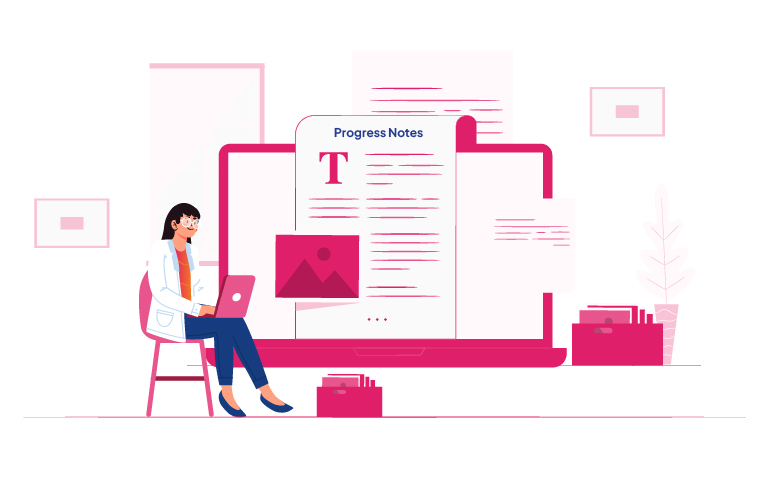19 May, 2025
How to Write Progress Notes That Accurately Reflect NDIS Participant Care
NDIS Latest News
6 min read

Progress notes are one of the most essential, yet often overlooked, aspects of delivering quality care under the NDIS framework. While rostering, budgeting, and participant engagement receive much attention, it’s the day-to-day documentation — progress notes — that reflect the real substance of service delivery.
For support workers and providers, writing accurate, meaningful progress notes is not just about fulfilling an administrative task. These records tell the story of a participant’s journey, their development, their setbacks, and the care they receive. When done well, they become a powerful tool for ensuring continuity, accountability, and growth, both for the participant and the provider.
Understanding the Purpose of Progress Notes
In the NDIS context, progress notes serve several critical purposes. First and foremost, they document what support was delivered and how the participant responded. This ensures accountability and transparency across shifts, teams, and locations.
But their importance extends far beyond record-keeping. Progress notes:
- Guide future care decisions based on observed needs and preferences
- Provide evidence of service delivery during NDIS audits
- Help coordinators and allied health professionals monitor progress against goals
- Serve as communication tools between different support staff
- Support plan reviews and funding decisions
In short, they are an essential bridge between the everyday work of support and the larger framework of participant outcomes.
Characteristics of Quality Progress Notes
A high-quality progress note captures events and observations clearly, accurately, and professionally. It reflects what happened during the shift without unnecessary commentary or subjective interpretation.
There are several key characteristics of effective documentation:
- Clarity: Notes must be easily understood by others. Use straightforward language and avoid jargon.
- Objectivity: Describe only what was observed or reported, not personal opinions or assumptions.
- Relevance: Include information that aligns with the participant’s goals and support plan.
- Timeliness: Notes should be written as soon as possible after the shift to ensure accuracy.
- Consistency: Notes should follow a consistent structure across the organisation to reduce confusion and ensure compliance.
Documentation that ticks these boxes does more than fulfil requirements — it supports better care delivery across the board.
Common Gaps in Documentation
Despite their importance, many providers struggle with documentation quality. Common challenges include:
- Generic notes that do not reflect individual needs or goals
- Delayed entries, leading to incomplete or vague recollections
- Subjective language or emotional interpretations
- Lack of connection to the participant’s broader support plan
- Missed incidents or behavioural observations
These issues not only affect the quality of care but can also compromise compliance, especially during audits. With the NDIS Quality and Safeguards Commission increasingly focused on participant outcomes and provider accountability, poor documentation is a risk most providers can’t afford.
Building a Culture of Strong Documentation
Writing effective progress notes is not simply about staff training. It requires a whole-of-organisation approach where documentation is treated as a core part of care — not an afterthought. This includes:
- Clear internal policies on what should be recorded and how
- Ongoing mentoring or review processes for note quality
- Adequate time allocated for staff to complete notes properly
- User-friendly systems that reduce friction and support accurate record-keeping
Quality improves naturally when documentation is embedded into daily routines and supported with the right tools.
The Role of Technology in Streamlining Notes
Many support workers still rely on paper-based forms or manual entry at the end of the day. These systems are prone to delays, duplication, and lost information.
Digital tools offer a smarter alternative. A platform like RotaWiz simplifies progress note management by integrating note-taking directly into the support workflow.
With RotaWiz, support workers can:
- Write and submit notes directly from a mobile device
- Access care plans and participant goals in real time
- Receive reminders to complete documentation
- Link notes directly to the participant’s plan outcomes
- Maintain secure, timestamped records that are accessible to relevant team members
The result is a more consistent and efficient process that supports better outcomes and ensures you’re always prepared for audits.
By reducing reliance on memory and eliminating the risk of forgotten details, digital systems not only improve compliance — they also make it easier for staff to focus on what matters most: delivering quality care.
Supporting NDIS Compliance with Strong Records
Progress notes play a key role in demonstrating compliance with the NDIS Practice Standards. Providers are expected to show that supports are delivered in line with participants’ plans, that incidents are recorded and acted on, and that services are tailored to individual needs.
Good notes provide that evidence. They help auditors, families, and even internal stakeholders understand what’s happening on the ground — and whether supports are making a meaningful difference.
Platforms like RotaWiz are designed to align with these compliance requirements, offering features that support secure data storage, version control, and structured note templates that guide staff to include the right level of detail.
Meet the Team Behind RotaWiz at the Sydney Disability Connection Expo
If you’re ready to elevate your approach to progress notes, there’s no better opportunity than the upcoming Sydney Disability Connection Expo 2025, happening on May 23–24 at ICC Sydney.
The RotaWiz team will be exhibiting, offering:
- Live demos of their mobile documentation tools
- One-on-one consultations with NDIS providers and support coordinators
- Walkthroughs of how RotaWiz supports compliant, real-time note-taking
- Insights into setting up your organisation for scalable, streamlined documentation
Whether you’re a sole trader or managing a large team, you’ll be able to explore how RotaWiz fits into your workflow — and see how it helps teams stay organised, connected, and ready for anything.
Final Reflections
Accurate and thoughtful progress notes are a cornerstone of quality NDIS service delivery. They provide the detail behind the support, the narrative behind the goals, and the evidence behind every hour worked.
They are not optional extras — they are part of the participant experience, your professional responsibility, and how you build trust in your service.
As the sector continues to evolve, having the right systems in place to support timely, high-quality documentation isn’t just smart — it’s essential. Platforms like RotaWiz don’t replace the judgment or care of your team — they support it, streamline it, and strengthen it.
If your organisation is looking to improve how progress notes are written, stored, and shared, now is the time to explore solutions built for the NDIS. Whether online or in person at the Sydney Expo, RotaWiz is here to help you get there.
Related Stories for You
Top 10 Best NDIS Rostering Software in Australia for 2026
November 5, 2025


